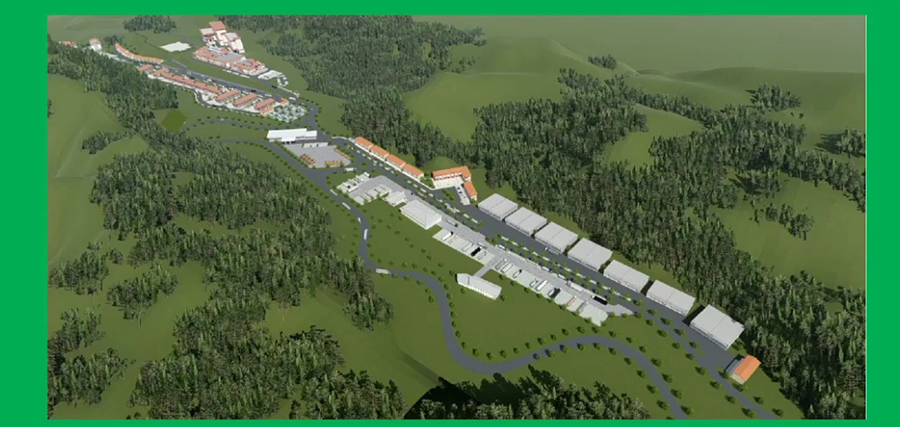YANGON—The Kachin State government has signed a memorandum of understanding (MOU) with a Chinese-backed company to develop a business park project in Kanpiketi, a border town in northern Myanmar, as part of Beijing’s ambitious grand infrastructure plan, the Belt and Road Initiative (BRI).
On Wednesday, the MOU was signed by the state government and Myanmar Heng Ya Investment Development Company Ltd, a joint venture between Myanmar’s Kampaiti Development Company Ltd and China’s Yunnan Tengying Trading Company Ltd. The Chinese company holds a 70-percent stake while the Myanmar company holds 30 percent.
The signing ceremony was held at the Kachin State government office in Myitkyina, the state capital, witnessed by State Minister of Finance, Revenue, Planning and Economy U Wai Lin, State Minister for Electricity and Industry U Win Nyunt and other officials from both sides, according to a press release from the Myanmar Ministry of Information.
At an estimated cost of US$22.4 million (31.85 billion kyats), the Kanpiketi Business Park will cover nearly 70 acres (28 hectares) in the border town in northern Kachin State’s Special Region 1. The area is controlled by the New Democratic Army-Kachin (NDAK) militia, which is allied with the Myanmar military.
According to the Directorate of Investment and Company Administration (DICA), the sons of NDAK militia founder Zahkung Ting Ying are the directors of the Kampaiti Development Company. The NDAK was converted into a Border Guard Force (BGF), a government-sponsored militia, in 2009 and still has significant influence in Special Region 1.
Yunnan Tengying Trading Company Ltd is a subsidiary of Yunnan Baoshan Hengyi Industry Group. The Irrawaddy has learned that Baoshan Hengyi also operates in the Kachin State capital of Myitkyina under the name Yunnan Tengchong Heng Young Investment Company (YTHYIC). The company signed an agreement with the Kachin State government in 2018 to develop the US$400-million Myitkyina Economic Zone on 4,700 acres of land along the historic Ledo Road. The project has drawn criticism for lacking transparency.
According to U Wai Lin, the business park project includes plans to construct a South Asia-Southeast Asia Culture Park (Zone A) on 12.65 acres, two Trade and Logistics Zones (Zones B and D) on 8.8 acres and 12.7 acres, a Border Inspection Gate (Zone C) on 5.1 acres and a Business Shop (Zone E) on 1.65 acres.
The joint venture company will implement Zone C first. It will include a border inspection gate, government staff housing, a waiting area and related facilities. The company plans to invite other investors to construct the other zones.

At the signing ceremony, U Wai Lin promised that the government would implement the project with transparency.
Myanmar and China will work together to promote cross-border trade, control illicit border trade and offer job opportunities to local people, he said.
The Kachin parliament approved a proposal to implement the project last week. According to the Kachin government, local residents of the project area will be displaced but the number of people is still unknown.
The Irrawaddy has learned that the government has yet to inform local people about the project.
Local lawyer U Gannes Basnez, who works with local residents on land issues, told The Irrawaddy, “The MOU should not have been signed until the state government explained the project to local people.”
“They need to know the pros and cons of the project,” U Gannes Basnez said.
“The government needs to publicize the MOU so we can learn the details. That would allow us to anticipate what issues we will be facing due to the project,” he added.
Myanmar became an official member country of the BRI after signing a 15-point MOU on the China-Myanmar Economic Corridor (CMEC) in 2018.
The business park is one of three cross-border economic cooperation zones under the CMEC agreement. The CMEC will reach from China’s Yunnan Province to Mandalay in central Myanmar and then stretch south to Yangon and west to the Kyaukphyu Special Economic Zone (SEZ) in Rakhine State.
The two sides agreed to build a number of cross-border zones along the countries’ shared border during a visit by State Counselor Daw Aung San Suu Kyi to Beijing to attend a forum on the BRI in 2017.
The Myanmar government approved three sites in Kachin and Shan states in 2018 at the first implementation meeting of the Economic Cooperation Zones Central Committee in Naypyitaw. The cross-border zones will be developed in Kanpiketi Town, Shan State’s Muse Township and Chinshwehaw in Shan State’s Laukkai Township, part the Kokang Self-Administered Zone.
The Irrawaddy has also learned that the name of the Kanpiketi project was changed from a cross-border economic cooperation zone to the Kanpiketi Business Park Project during the central committee meeting last October in Myitkyina.
Launched in 2013, the BRI is Chinese President Xi Jinping’s signature foreign policy project. It aims to build and expand roads, rail lines and shipping lanes linking at least 70 countries from China to Europe through Central and South Asia, the Middle East and Russia to boost trade and investment.
You may also like these stories:
MNLA Attacks DKBA Splinter Group in Myanmar’s Karen State
Ethnic Chin Oppose Plan for Statue of Myanmar Independence Hero
Karenni Youth Jailed for Calling Govt Officials Criminals, ‘Enemies of Ethnic Unity’

















